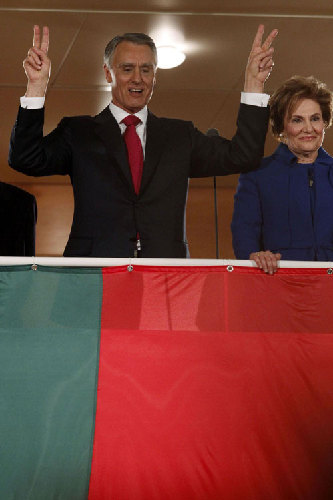Politics
Portuguese president wins re-election in landslide victory
Updated: 2011-01-24 13:47
(Xinhua)
LISBON -- Portuguese President Anibal Cavaco Silva secured a landslide vitory in the first round of voting Sunday, promising to help drag the country out of the current debt quagmire.
According to the National Electoral Commission, Silva got 52.9 percent of the vote while his main rival Manuel Alegre, a candidate backed by the ruling Socialist Party, came as a distant second with 19.8 percent.
|
 Re-elected Portuguese President Anibal Cavaco Silva stands next to his wife Maria as he gestures to supporters after the announcement of electoral results in Lisbon January 23, 2011. [Photo/Agencies] |
After the election results were announced, Silva vowed to help his country overcome its current difficulties by slashing high unemployment and heavy debt.
The former economics professor also promised to respect the power that the constitution granted to him.
Compared with the other five candidates, Silva, with his rich experience in economics and politics, is widely seen as being more capable of collaborating with the government in lifting the country out of its debt crisis.
Earlier on Sunday while casting his ballot at a primary school, Silva said: "We do expect that the results of this election may make a positive contribution to Portugal to solve its problems."
Silva called on every voter to go out and cast a ballot despite the unusually cold weather as the election was crucial to the country's future.
Mired in debt, the Portuguese government has announced a series of austerity packages, including public wage cuts and tax hikes to reduce its budget deficit to 4.6 percent of its GDP in 2011 from an estimated 7.3 percent last year.
The measures, however, have diminished the popularity of the minority government led by Socialist Prime Minister Jose Socrates, causing it to lose the absolute majority in parliament in the 2009 elections.
| ||||
Asked if he would use his power to dissolve the parliament and call for new elections, the president said it is not the time to predict the future.
"I'm a president in favor of stability and consider it very important for Portugal to have political stability to solve its problems," he said.
Silva, who was elected in January 2006 for a five-year term, is supported by the Social Democratic Party, the main opposition party.
When announcing his decision to run for a second term, Silva said, "Given the extremely difficult situation Portugal is facing at the moment, I thought it was my duty to stand for election. With my experience and my knowledge, I can help my country."
Silva, who was elected president in the first round of voting in 2006, is said to have played a major role in putting the country's economy on the fast track when serving as prime minister from 1985 to 1995.
E-paper

Chinese tourists as top shoppers
Since last summer, Chinese tourists emerged as the top tax-free shoppers in Europe.
Golden run ahead
Looking abroad
Mapping out a plan
Specials

The green lantern
Environmental concerns are shedding new light on a colorful tradition

Inland interchange
Chongqing bets on its position as a hub for China's west.

Zooming in on Chinese skies
Helicopter companies ride on country's growing interest in luxury aviation.


